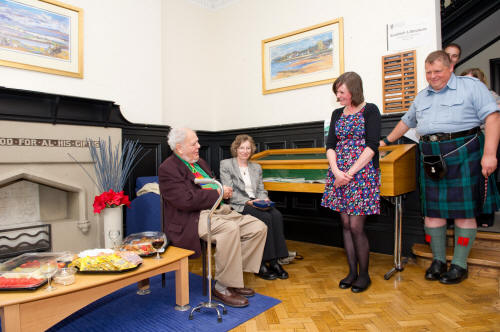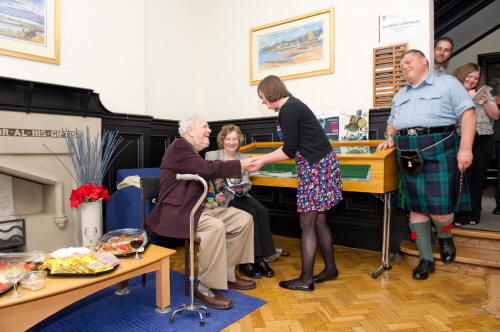|
Edited
by Frank R. Shaw, FSA Scot, Dawsonville, GA, USA
Email:
jurascot@earthlink.net
Despite her busy schedule, Dr. Rhona Brown was kind enough to accept my
invitation to write about the newly established G. Ross Roy Medal which was
presented for the first time this month to Dr. Ainsley McIntosh of the
University of Aberdeen. It is always a joy to have Dr. Brown appear in the
pages of Robert Burns Lives!, and those interested can find
her previous article on Professor Roy at
http://www.electricscotland.com/familytree/frank/burns.htm,
Chapter 61.
Dr. Brown is Lecturer in Scottish Literature at the University of Glasgow
where she teaches Scottish literature from the medieval period to the
nineteenth century. Her monograph,
Robert Fergusson and the Scottish Periodical Press,
will be published by Ashgate in 2011. She is currently researching the
Scottish magazines and periodicals of the pre-Blackwood's era and continues
to publish on eighteenth-century literature. Welcome back, Dr. Brown! (FRS:
9.30.10)
Presentation of the G. Ross Roy Medal for Excellence in Postgraduate Study
in Scottish Literature
University of Glasgow, 9 September 2010

Dr. Roy and Dr. Ainsley McIntosh
In
the summer of 2009, Professor G. Ross Roy was named as an honorary graduate
of the University of Glasgow for his esteemed role in Scottish literary
studies, and particularly for his vast and valuable contribution to Robert
Burns Studies. In September 2010, the already cordial and enduring
relationship between Professor Roy and Scottish universities was further
cemented, with the presentation of the G. Ross Roy Medal for Excellence in
Postgraduate Study in Scottish Literature, to Dr. Ainsley McIntosh of the
University of Aberdeen.
Professor Roy is an apt inspiration for this award. After graduating from
the Universities of Concordia and Montreal, Strasbourg and Paris, and after
serving as a Canadian Air Force navigator, he taught and researched at
institutions in Quebec, Montreal and Texas before settling at the University
of South Carolina in 1965. His activities at South Carolina demonstrate his
scholarly generosity as well as his encouragement of new research – and,
indeed, of new researchers – in Scottish literature. Inspired by his
grandfather’s enthusiasm for Burns, Professor Roy began amassing an
important collection of Burnsiana and Scottish poetry in Columbia’s Thomas
Cooper Library. As well as revising J. De Lancey Ferguson’s collection of
Burns’s letters in exemplary fashion, he also founded, with his wife, Lucie,
Studies in Scottish Literature, a journal at the top of its field. As
well as these major contributions, Professor Roy and Lucie established the
Ormiston Roy Fellowship – inaugurated in memory of Professor Roy’s
influential grandfather in 1990 – which allows international scholars, both
new and established, to visit and explore the valuable resources held at
Columbia. As a result of this tireless activity in support of Scottish
literature, Professor Roy has been honoured by the Universities of Glasgow
and Edinburgh, by the Eighteenth Century Scottish Studies Society and, most
recently, was one of the first Honorary Fellow of the Association for
Scottish Literary Studies.
The possibility of a prize to honour Professor Roy and to award outstanding
postgraduate research was first mooted by Professor Emeritus Douglas
Gifford, former Head of Scottish Literature at the University of Glasgow.
His idea received key support from Dr. Gerard Carruthers, current Head of
Scottish Literature, whose work enabled the Medal to come into being. The
Medal received important backing from the Universities Committee for the
Teaching of Scottish Literature – a group which comprises members and
representatives from each Higher Education institution in Scotland engaged
in the teaching of Scottish literature – and from Dr. Gavin Wallace, in one
of his final acts as Head of Literature in the Scottish Arts Council.
Unfortunately, Dr. Carruthers and Dr. Wallace were unable to attend the
event, but their important contributions were recognised by the speakers.
Alan Riach, Professor of Scottish Literature at the University of Glasgow,
and Professor Nigel Leask, Head of the School of Critical Studies, began
proceedings by welcoming guests, before Professor Rory Watson,
representative of the Universities Committee for the Teaching of Scottish
Literature, paid tribute to those involved in bringing the G. Ross Roy Medal
to fruition. Highlighting the Committee’s aim – ‘to promote, defend and
encourage’ the study of Scottish literature at university level – Professor
Watson emphasised that Professor Roy was a suitable inspiration for the
award. Dr. Robert Irvine of the University of Edinburgh, a member of the
judging panel for the G. Ross Roy Medal, followed with a tribute to the
finalists demonstrating the outstanding quality and exceptional range of the
doctoral work under consideration.

Presentation of Medal
Finally, guests were introduced to the winner of the G. Ross Roy Medal: Dr.
Ainsley McIntosh, whose doctoral thesis, ‘A Critical Edition of Walter
Scott’s Marmion’ was praised for its scrupulous, standard-setting
textual editing. According to Dr. Irvine, Dr. McIntosh’s research could –
and indeed, should – provide a template for future editions of Scott’s
poetry. Happily, Dr. McIntosh’s aptitude has been recognised at the
University of Aberdeen, where she has begun work as a Research Assistant on
a major project, funded by the Carnegie Trust and led by Dr. Alison Lumsden,
to produce a new edition of Scott’s poetry; Dr. McIntosh’s Marmion
will be one of the first texts to appear.
In
his presentation speech, Professor Roy shared his happiness that the
discipline of Scottish literary studies is now well established in the
United Kingdom while constantly gaining prestige in the United States of
America. The G. Ross Roy Medal will ensure that this trend continues to
develop. However, with its rewarding of outstanding postgraduate work, it
will play an important role not only in Scottish literary studies of the
present, but also of the future.
Rhona Brown
Scottish Literature, School of Critical Studies
University of Glasgow |

